Premier Peter Malinauskas announces sweeping changes to SA’s Covid policies, including isolation periods and mask rules
The isolation period for household close contacts will be cut to seven days and all mask mandates dumped within weeks – as modelling shows a huge increase in Covid hospitalisations.
SA News
Don't miss out on the headlines from SA News. Followed categories will be added to My News.
Close contact quarantine rules that have sparked widespread chaos have been slashed while mandatory masks will all but go within weeks, under sweeping changes to Covid-19 laws.
In a series of landmark decisions of his new government, Premier Peter Malinauskas unveiled a “significant” easing of rules that will free tens of thousands of people from isolation.
With up to 100,000 people confined to their homes, close contact rules will be halved, mask mandates will go by Good Friday but the state of emergency will be extended until May.
Authorities defended the timing of the changes and criticism it was too slowly introduced.
“I’m happy for thousands, in fact the tens of thousands of South Australians who will be the beneficiary of these rule changes,” the Premier said.
“I don’t think we want to be popping champagne corks just yet about Covid, there’s a long way to go. We know that Covid is going to be with us for some time.
“But the simple fact is these rule changes will make it easier for the families of South Australians and that is a good thing.”
Replay the press conference
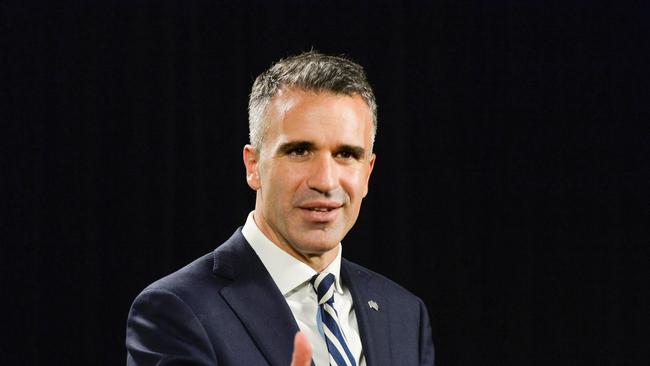
Under the sweeping changes The Advertiser foreshadowed, the time household close contacts must quarantine will be cut from a fortnight to one week with immediate effect.
SA Health will not impose a “rolling” rule meaning that quarantine times will start from day 0 of the infectious period of the first household member to fall ill regardless of how many people become sick.
Those serving between eight and 14 days can now leave their homes, subject to a negative Covid test – either a rapid antigen home check or a PCR lab swab.
After the first Covid-19 meeting of state cabinet’s Emergency Management Council, the definition of close contacts will be overhauled from midnight on Friday but not backdated.
A person will be forced to quarantine after being in contact with a Covid infectious person for at least four hours.
Currently, if you spent 15 minutes unmasked with a Covid-positive person, you are deemed to be a close contact.
The changes bring the state into line with national guidelines.
SA Health will also change the length of time a Covid-positive person cannot be considered a close contact from a current eight weeks to three months.
It comes as chief public health officer Nicola Spurrier warns of a “B2 wave” and modelling that shows 100 new Covid hospitalisations daily in the coming weeks.
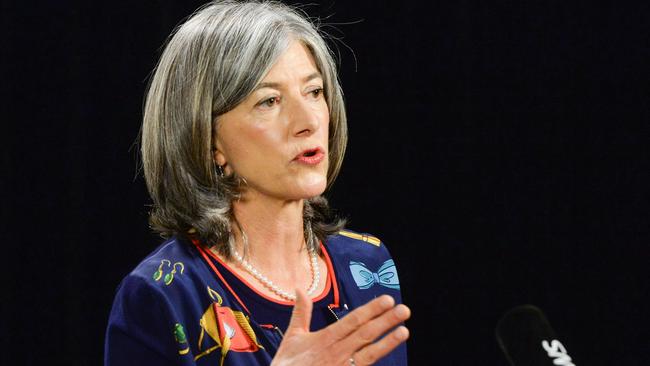
Covid rules overhauled
Mr Malinauskas said the changes would bring South Australia back into line with the rest of the nation.
“You’ve got to remember that in recent history, they’ve been somewhere between 80 to 100,000. People who find themselves in quarantine, that’s a big number,” he said.
“That’s a huge impact on the economy. Not just for employers but a big impact on families as well.
“And if we’re able to relax restrictions in a way that doesn’t compromise the health system, or people’s own health, that’s a good thing. And that’s worthy of acknowledgment and celebration.”
Mask mandates are also likely to be removed by April 14.
“Barring a new variant or a big change we are working towards removing mask mandates by April 14, the day before Good Friday,” he said.
Masks would still be required in high-risk settings such as aged care.
Adelaide Oval patrons will need only to wear masks in entrance queues and fully enclosed indoor areas at the venue.
Mr Malinauskas said his cabinet would approve Police Commissioner Grant Stevens’ request to extend the emergency management declaration by a further 28 days beyond April 1.
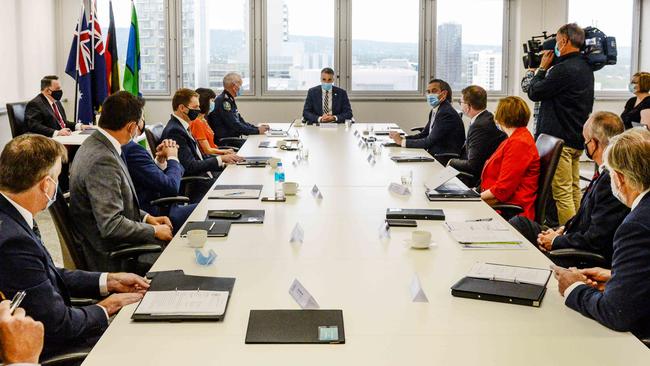
But he is determined to end the emergency management declaration by June 30.
The changes aim to get SA’s rules consistent with the rest of the nation.
“Today’s discussions have been informed by a big effort in increasing hospital capacity and numbers of boosters,” Mr Malinauskas said.
“We are not sparing any expense in increasing hospital capacity and booster take-up.”
He reiterated he wouldn’t support starting the school holidays earlier because it would have a “severe impact on parents and teachers”.
“Most families have two working parents and for single parents and sole traders, longer school holidays impose new difficulties on parents,” he said.
He did not support a blanket closure of schools, saying it was “an absolute last resort”.
Mr Malinauskas stopped short of expressing full confidence in SA Health chief executive Chris McGowan, who is facing the axe.
Senior government sources said Dr McGowan, the second-highest paid bureaucrat who started in 2018, is among those on “borrowed time”.
“I’m grateful for the work Mr McGowan had done, it’s been smooth so far,” he said, but failed to say the senior bureaucrat had his full confidence.
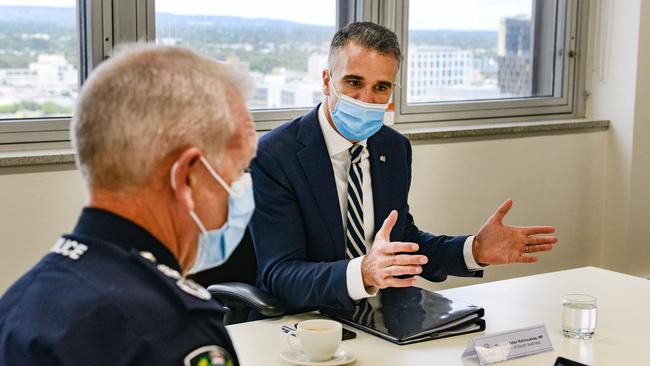
Hospital bed crisis
Health Minister Chris Picton said modelling showed an additional 100 Covid cases in hospital daily in the coming weeks, and the government was urgently seeking to increase bed capacity.
“There is immense pressure on our hospitals without increased number of Covid hospitalisations,” he said.
“The system only survived because non-urgent surgery was cancelled but we do not want to do that again … infections are now unavoidable. We are urgently seeking for hospital capacity to be found and staffed. We do not want to cancel non-urgent surgery again.
“There is not an empty ward waiting for Covid cases; our hospitals are chock-a-block already.
“We are going to have to manage an additional 100 cases every day in the coming weeks (in hospitals).”
Mr Picton said the modelling showed SA would not see a “significant change” because of the rules.
“(But) if we removed mask rules immediately that would see additional hospitalisations,” he said.
Nearly 400 beds were put aside by the former government as a short-term measure for Covid cases, some private, some public and some virtual at-home beds.
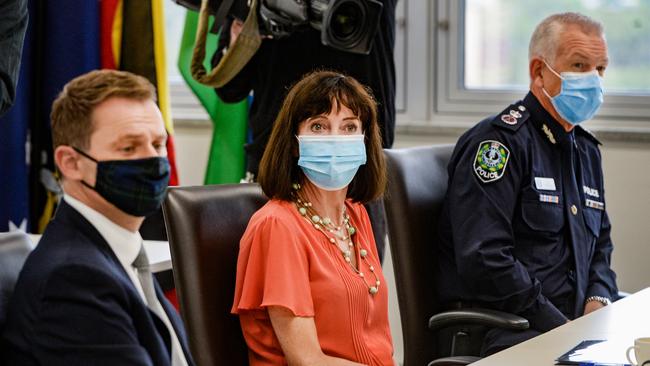
New Omicron ‘wave’ coming
Chief public health officer Nicola Spurrier said she was pleased to be able to make the changes to close contact rules.
“As we increase vaccinations we can remove other restrictions,” she said.
Prof Spurrier said the static quarantine period was now seven days, but it still required a negative test.
“The virus does not change, just the rules which are changing,” she said.
“You can come out of quarantine if you have a negative PCR or a negative RAT test.
“If you have had an infection with Covid (from midnight) you have 12 weeks in which you do not become a close contact, if you have contact with someone who is positive.
“Close contact definition is (from midnight) a cumulative four hours, rather than 15 minutes.”
She said households are still close contacts, but outside that the definition will be four hours “face-to-face without wearing a mask”.
Prof Spurrier said SA was facing a “B2 wave”.
“If we made too many changes at once, including taking away masks today, we would have a significant increase in the number of infections and the number of people requiring hospitalisation,” she said.
But she added SA should feel “confident” the mask mandate would be dropped from April 14., because modelling showed the risk would be lessened by then.
Friday’s Covid figures
SA has recorded 4549 new cases on Friday, bringing the total number of active cases to 28,190 in SA. There are 157 people in hospital with Covid in SA, six people in ICU and one person ventilated.
Sadly, there have been four more deaths linked to Covid in SA – three men and a woman.
Prof Spurrier said she expected a new Covid variant to hit SA.
“Whether it is more severe or more transmissible – but that doesn’t mean that in the interim we should have regulations we don’t need,” she said.
“Really there are no public health measures in place any more, we’ve (just) got masks and isolation.”
Mr Stevens said he hoped his latest request to extend the emergency declaration would be the last.
“We need to manage the current spike and quarantine and isolation requirements,” he said.
“The next extension will go to the first week of May but there is always the possibility that it will not be needed.”
He said the extension allowed SA Health to continue to manage Covid quarantine periods and established a “clear set of rules”.
With between 80-100,000 people in quarantine, Mr Malinauskas said tens of thousands of South Australians would benefit from the new rules.
“Covid will be with us for a while but these rule changes will make it easier for families,” he said.
Because the new emergency management committee was a cabinet subcommittee, its decisions could kept confident, he said.
“The Covid-ready committee had no authority to make decisions,” he said.
“A subcommittee of cabinet does has the power to make decisions, and that is why we have done that.”
Modelling from the University of Adelaide shows case numbers could hit up to 10,000 a day in early April at the peak of this Covid wave, with adult hospitalisations of more than 200.
The new government has released modelling that shows Covid cases in SA could top 10,000/day in the coming weeks. https://t.co/TwYGTpZiEL@theTiserpic.twitter.com/2ywmgsefKG
— Kathryn Bermingham (@KatBermingham) March 22, 2022
The state’s new premier unveiled his cabinet on Thursday, that included familiar faces such as Treasurer Stephen Mullighan and Infrastructure, Transport, Energy and Mining Minister Tom Koutsantonis.
Earlier in the week, Mr Malinauskas said “renewal is important”, foreshadowing his plans to make major changes to the state’s Covid operations.
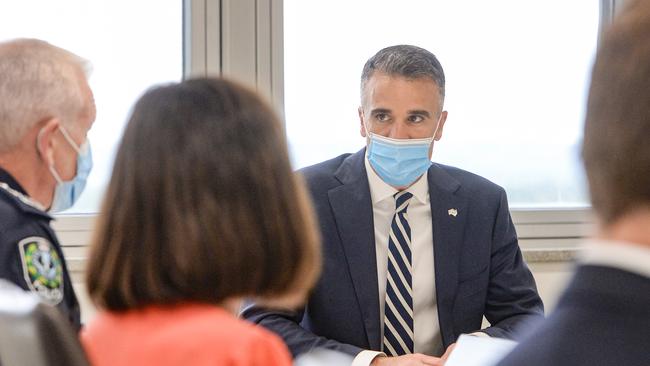
Mr Malinauskas said he was stunned to learn on Monday that all non-urgent elective surgery in public hospitals had been banned by the Marshall Government a day before the state election.
Sources said that Dr McGowan’s decision to keep the elective surgery ban was a major tipping point.
Other changes include:
■ Crown lawyers will develop new laws to replace the Emergency Management Act, which he wants to end by June 30 at the latest;
■ A new campaign will be launched to encourage South Australians to get their booster dose after rates remained stagnant for the past few weeks at 69 per cent; and
■ Chris Picton was formally announced as health Minister




